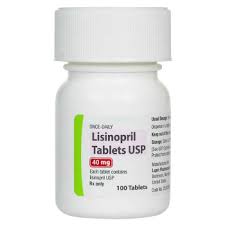What is Lisinopril ?
Lisinopril is a medication belonging to the drug class of angiotensin-converting enzyme inhibitors and is used to treat high blood pressure, heart failure, and heart attacks.
For high blood pressure it is usually a first-line treatment.
It is also used to prevent kidney problems in people with diabetes mellitus
Uses
Lisinopril is used to treat high blood pressure. Lowering high blood pressure helps prevent strokes, heart attacks, and kidney problems.
It is also used to treat heart failure and to improve survival after a heart attack.
Lisinopril belongs to a class of drugs known as ACE inhibitors.
It works by relaxing blood vessels so blood can flow more easily.
How to use lisinopril oral
Take this medication by mouth with or without food as directed by your doctor, usually once daily.
If you are using the suspension form of this medication, shake the bottle well before each dose.
Carefully measure the dose using a special measuring device/spoon.
Do not use a household spoon because you may not get the correct dose.
The dosage is based on your medical condition and response to treatment.
For children, the dosage is also based on weight.
To reduce your risk of side effects, we advise you to start this medication at a low dose and gradually increase your dose.
Use this medication regularly to get the most benefit from it.
To help you remember, take it at the same time each day.
Keep taking this medication even if you feel well.
Most people with high blood pressure do not feel sick.
For the treatment of high blood pressure, it may take 2 to 4 weeks before you get the full benefit of this medication.
For the treatment of heart failure, it may take weeks to months before you get the full benefit of this medication.
Side Effects
Dizziness, lightheadedness, tiredness, or headache may occur as your body adjusts to the medication.
Dry cough may also occur.
If any of these effects last or get worse, tell your doctor or pharmacist promptly.
To reduce the risk of dizziness and lightheadedness, get up slowly when rising from a sitting or lying position.
Remember that this medication has been prescribed because your doctor has judged that the benefit to you is greater than the risk of side effects.
Many people using this medication do not have serious side effects.
Although lisinopril may be used to prevent kidney problems or treat people who have kidney problems, it may also rarely cause serious kidney problems or make them worse.
Your doctor will check your kidney function while you are taking lisinopril.
Tell your doctor right away if you have any signs of kidney problems such as a change in the amount of urine.
Warnings
This medication can cause serious (possibly fatal) harm to an unborn baby if used during pregnancy.
It is important to prevent pregnancy while taking this medication.
Consult your doctor for more details and to discuss the use of reliable forms of birth control while taking this medication.
If you are planning pregnancy, become pregnant, or think you may be pregnant, tell your doctor right away.
Precautions
Before taking lisinopril, tell your doctor or pharmacist if you are allergic to it; or to other ACE inhibitors (such as benazepril); or if you have any other allergies.
This product may contain inactive ingredients, which can cause allergic reactions or other problems.
Before using this medication, tell your doctor or pharmacist your medical history, especially of: history of an allergic reaction which included swelling of the face/lips/tongue/throat (angioedema), blood filtering procedures (such as LDL apheresis, dialysis), high level of potassium in the blood.
This drug may make you dizzy. Alcohol or marijuana (cannabis) can make you more dizzy.
Do not drive, use machinery, or do anything that needs alertness until you can do it safely.
Limit alcoholic beverages.
Talk to your doctor if you are using marijuana (cannabis).
Severe sweating, diarrhea, or vomiting may cause dehydration and cause you to feel lightheaded.
To prevent dehydration, drink plenty of fluids unless your doctor tells you not to.
Before having surgery, tell your doctor or dentist about all the products you use (including prescription drugs, nonprescription drugs, and herbal products).
This product may increase your potassium levels.
Before using potassium supplements or salt substitutes that contain potassium, consult your doctor or pharmacist.
Older adults may be more sensitive to the side effects of this drug, especially dizziness and increases in potassium level.
Tell your doctor if you are pregnant or plan to become pregnant.
You should not become pregnant while using lisinopril. Lisinopril may harm an unborn baby.
If you become pregnant, talk to your doctor right away about the risks and benefits of this medication.
It is unknown if this medication passes into breast milk.
Interactions
Drug interactions may change how your medications work or increase your risk for serious side effects.
This document does not contain all possible drug interactions.
Keep a list of all the products you use (including prescription/nonprescription drugs and herbal products) and share it with your doctor and pharmacist.
Do not start, stop, or change the dosage of any medicines without your doctor’s approval.
Some products that may interact with this drug are: aliskiren, certain drugs that weaken the immune system/increase the risk of infection (such as everolimus, sirolimus), lithium, drugs that may increase the level of potassium in the blood (such as ARBs including losartan/valsartan, birth control pills containing drospirenone), sacubitril.
Some products have ingredients that could raise your blood pressure or worsen your heart failure.
Tell your pharmacist what products you are using, and ask how to use them safely (especially cough-and-cold products, diet aids, or NSAIDs such as ibuprofen/naproxen).
Overdose
If someone has overdosed and has serious symptoms such as passing out or trouble breathing, call 911. Otherwise, call a poison control center right away.
Notes
Do not share this medication with others.
Lifestyle changes that may help this medication work better include exercising, stopping smoking, and eating a low-cholesterol/low-fat diet. Consult your doctor for more details.
Lab and/or medical tests (such as kidney function, potassium levels) should be done while you are taking this medication. Keep all medical and lab appointments. Consult your doctor for more details.
Check your blood pressure and pulse (heart rate) regularly while taking this medication. Learn how to check your own blood pressure and pulse at home, and share the results with your doctor.
Missed Dose
If you miss a dose, take it as soon as you remember. If it is near the time of the next dose, skip the missed dose. Take your next dose at the regular time. Do not double the dose to catch up.
Storage
Store the tablets and suspension at room temperature away from light and moisture. Do not store in the bathroom. Discard any unused suspension after 4 weeks. Keep all medications away from children and pets.
Do not flush medications down the toilet or pour them into a drain unless instructed to do so. Properly discard this product when it is expired or no longer needed.
What are the Milligram Strength of Lisinopril :
Lisinopril is a medication used to treat high blood pressure (hypertension), heart failure, and certain other cardiovascular conditions. It is available in various milligram (mg) strengths, including:
Lisinopril 2.5 mg
Lisinopril 5 mg
Lisinopril 10 mg
Lisinopril 20 mg
Lisinopril 30 mg
Lisinopril 40 mg
Where to buy Lisinopril : We are one of the mosts trustsworthy online vendors of prescription medications of which lisinopril is amongsts our lists of best sale products. No doubts all miligtam strength of this medication can be gotten from us at very good and affordable prices . Delivery also available


